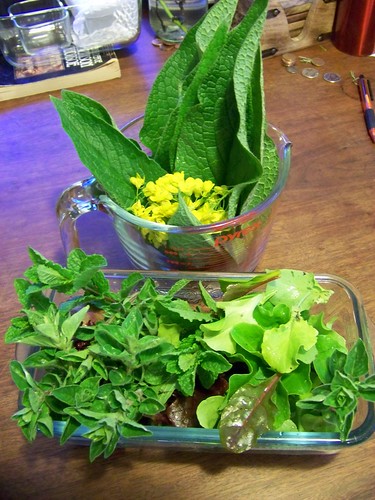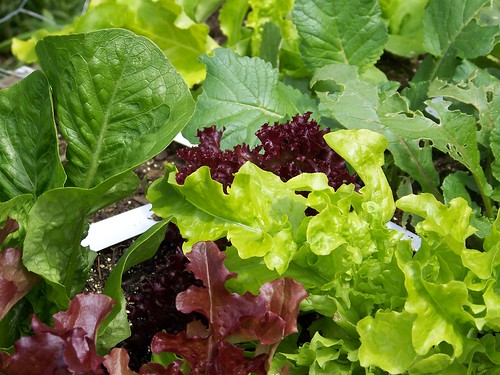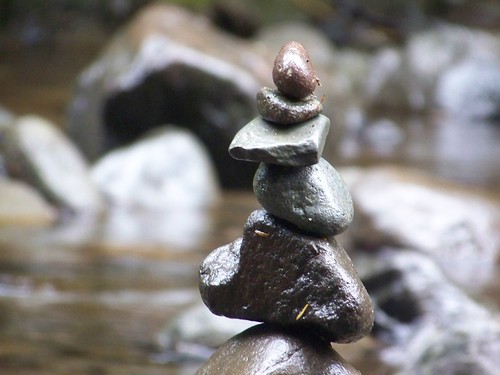As I said in my post, I am going to try to incorporate more stories and poems into my blog posts as a way to illustrate, rather than simply tell about, the turning of the wheel of the year. Some posts will include short stories or poems and some explination while others, like this one, will simply be a story.
This story is an old Russian tale I first heard through the
Jim Henson's The Storyteller series. It caught my imagination and when I found a written version of the story I knew I would have to retell it as my Death Moon story. Here is my version, with links to the Jim Henson and Arthur Ransome versions at the bottom.
*** *** *** ***
The Soldier and DeathOnce upon a time there was a soldier who had served his King well for 25 years and was finally free to go home. He gathered his cloak and his sword, kissed his companions good bye, and took three dry biscuits before setting off into the early winter morning.
He whistled an ancient tune as he traveled the high road past snowy fields and under grey skies. He walked and he whistled until he met a beggar along the road. The old man was dressed in patched and ragged clothes and begged for alms. The soldier had no money to his name but gave the old man one of his three dry biscuits.
“God keep you and Goddess bless” said the beggar.
“Goddess bless you as well, old man” said the soldier and he set off.
He whistled his ancient tune as he traveled the high road through wooded hills and marshy lands. He walked and he whistled until he met another beggar along the road. The old man was dressed in clothes even more patched and ragged than the first and was also begging for alms. The soldier had no money to give but handed the old man the second of his three dry biscuits.
“God keep you and Goddess bless” said the beggar.
“Goddess bless you as well, old man” said the soldier and he set off.
He whistled his ancient tune as he traveled the high road past fields of wooly sheep and shaggy cows. He walked and he whistled until he met a third beggar along the road. This old man was dressed in even more patched and ragged clothes than the other two. He looked so thin and weak he could hardly stand as he begged for alms. The soldier thought of his one remaining dry biscuit but decided that he was close to home and the old man needed it more than he did. He handed the beggar his third dry biscuit.
“God keep you and Goddess bless” said the beggar.
“Goddess bless you as well, old man” said the soldier.
“Is there anything you would like as thanks for your kindness?” the beggar asked.
“There is nothing you can give me beyond your blessings, friend” replied the soldier.
“Looks can be deceiving, young man. What would you like?”
The soldier thought back fondly on evenings spent with his companions wagering all they could think to wager playing cards. He asked the old man if he had any such thing as a pack of cards about him. The old man reached under his patched and ragged cloak and pulled out a small but beautiful deck and something else the soldier could not at first identify.
“Take these as thanks, and you will never lose no matter who you play against. And take this sack as well. If you come across any beast of fowl and want to have it just tell it to get into the sack and it will. Then you can do with it what you wish.”
“Thank you kindly and Goddess bless” said the soldier one more time before he set off again, whistling his ancient tune traveling down the high road.
After a night and a day of traveling the soldier found himself on the shore of a small glittering lake. He stopped to rest his feet and quench his thirst. As he lay back among the grass he noticed three wild geese paddling across the lake. “If only I could catch them,” he thought, “then I would not be hungry as I am now.” And then he remembered the sack the old man had given him. He stood up, held the sack open and cried “Hey, you, geese! See my sack? Get into it!”
The geese rushed quickly towards the sack and clambered over themselves to get into it. When all three were in the sack the soldier tied the top with two double knots, put the sack on his shoulder and set off again. His tune was a bit less lively due to the effort of carrying the three geese, but he traveled still along the high road past stacks of hay and fields of stubble.
Before night fall he found himself on the main street of a small but lovely town. He found a well kept inn and asked for the landlord.
“Sir,” said the soldier, “In my sack are three fat geese. I would like one roasted for my dinner. I’ll trade the other for a bottle of your finest wine and you can keep the third for your troubles.”
“Oh, aye,” cried the landlord and rushed off with the sack into the kitchens.
“Don’t forget to bring back the sack,” the soldier called after him.
In no time at all the soldier was tucking in to a wonderful dinner of goose roast in honey and cloves and washing it down with a bottle of fine red wine. He spent his evening dancing and laughing with other guests at the inn and finally laid his weary body down in a soft, warm bed upstairs.
In the morning the soldier woke up and looked out the window of the inn. On the hill above the town stood a beautiful palace all made of rose red stone with red tile roofs, a tower, walled gardens and beautifully carved wooden door posts and window frames. The odd thing was, that none of the windows had glass in them, and the gardens were clearly overgrown, and some of the roof tiles were broken or missing.
When the soldier went down for breakfast he asked the landlord about the palace.
“Oh, aye, that palace belongs to the Duke who rules these lands.” said the landlord. “It’s been empty these three years, though, because evil spirits have taken up living there. They say they are angry that the Duke didn’t pay proper respects to the stones and trees that made his palace. Every night the spirits come in and make such devilish noise, stomping and singing, hooting, hollering and playing cards. There’s no living there for decent folks.”
“Can no one clear them out?” asked the soldier.
“Easier said than done.” replied the landlord. “Brave men go in live and well in the evening and in the morning the Duke’s servants have to sweep the floors to pick up all the pieces of their bones.”
“I’ve served my King well for 25 years. Fire won’t burn a soldier and water won’t drown him. A single night in that palace won’t be the end of me.” And with that the soldier asked the landlord to point him in the direction of the Duke’s new home, wishes the landlord well and set off to talk to the Duke.
“Your majesty,” said the soldier after giving the Duke a proper bow and salute, “will you give me leave to spend one night in your empty palace?”
“No man has survived a night in that palace since the evil spirits have taken up residence. I hate to see the end of such a fine man as yourself,” replied the Duke.
“I’ve served my King well for 25 years. Fire won’t burn a soldier and water won’t drown him. A single night in that palace won’t be the end of me,” Said the soldier.
“Well, if that be so then God keep you and Goddess bless,” the Duke said, “Spend the night there if you’ve set your heart on it.”
The soldier entered the palace, whistling his ancient tune, cards in his pocket, sack on his back. He whistled and sang his way through all the empty rooms admiring the beautiful rose colored stone and admiring the carved wooden beams. He lit a small fire in large room, and sat down at the table to wait for the spirits, shuffling his cards and whistling his tune the whole night through.
At 12 o’clock sharp he heard such a noise as the soldier had never heard. Yelling and screaming, dancing and singing, drums and fiddles, hooting, hollering, stomping and yowling. The room filled with the devilish little spirits, with long fingers and toes on the ends of their long arms and legs, wispy white hair floating above their pale faces and sneering mouths filled with sharp pointed teeth.
“You, soldier,” one cried, “What are you doing here? There’s no living here for decent folks”
“What a nice tune he has” another cried. “And lovely cards” yet another cried. “And such a decent soul” a third remarked.
“Deal out the cards, we’ll take them all from you, and then we will tear you to pieces and eat you up!” the first screamed again.
The soldier laughed. “Be sure you know who is eating who. What do you have to wager against my tune, my cards and my soul.”
“We have 40 barrels of gold, we do” cried one of the spirits.
“Bring them here and let’s play a game” said the soldier.
No sooner than he had said it had forty of the spirits dragged forty barrels of gold into the room. The soldier shuffled his cards and dealt them out to the spirits pushing and shoving for room on the benches around the table. They played a game and the soldier won. They played again, and the soldier won again. A third game they played and a third time the soldier won.
So it went on all night with the spirits using all their cunning to cheat and lie but the soldier winning game after game. The gold moved from one end of the room to the other until the whole 40 barrels were stacked up behind the soldier’s chair. When the spirits realized they had no more money to lose they cried out with such a clamor. They yelled and they howled, they screamed and they screeched.
“Tear him to pieces! Eat him up” they cried.
“Be sure you know who is eating who,” said the soldier as he pulled out his sack. “Do you know what this is?”
“A sack.” One of the spirits replied.
“If it is a sack, then get in it!” called the soldier. With a rushing and a whistling all the spirits flew into the sack, clambering over each other to get into it. When they were all in the soldier tied up the sack with two double knots and threw the sack on the ground. He kicked it and tossed it around, punching it and beating it until the spirits cried out for mercy.
“Do you promise to leave this palace and never come back?” asked the soldier.
“Yes, yes, we promise!” cried the spirits.
And with that the soldier untied the sack and let the spirits fly out. And fly out they did! They tripped over each other to get away from that soldier and his sack. The soldier, however, caught the last spirit as it left the sack and held it by the leg. The spirit hung, gibbering and flailing, trying to get away. The soldier grabbed the spirit’s hat and said
“Spirit, promise me to be my faithful servant.” There was nothing to be done other than agree so the spirit agreed and agreed so the soldier would let him go.
“I will keep your hat and when I call for you, you must come to me.” Said the soldier and then let the spirit go.
The last spirit hopped off screaming, following the others over fields and woods, hills and pastures, across the Great River to the Isle of the Dead. They called all the other spirits and spooks, fairies and furies, banshees and angels, dryads, nymphs and gnomes, crying and aching in all their bones, and told them about the soldier and his sack. They set sentinels all around the Isle of the Dead, and warned the ferryman who ran the ferry across the Great River, and ordered them to watch well, and whatever they did, not on any account to let in the soldier with the sack.
In the morning the Duke and his servants came to the palace and instead of finding the soldier ripped to pieces found him whistling his ancient tune in front of a small fire in the large room. Behind him was the forty barrels of gold and at his side his sack. The soldier told the Duke all that had happened and how he had won the gold from the spirits and chased them away so no spirits would dare set foot within a hundred miles of the palace.
“If that be so,” said the Duke, “then we shall move into this palace at once and you shall live here with me as a brother.” And so they did. They moved in all of their tables and beds, servants and cooks and even the Duke’s wife and children. Soon after that the soldier himself took a wife and they all lived happily in the beautiful palace above the small town.
One year after the soldier married his wife gave birth to a beautiful son. The soldier loved his son more than anything and told him stories of his own valor and made up stories about when the boy grows up and becomes a general himself. The son grew into a fine young boy, happy and strong. One day, when the boy was three years old, he fell ill with a terrible fever. The soldier and his wife prayed and tended him, they called in doctors and wise women, they fed him teas and gave him baths and special ointments were put on his chest and forehead. Despite all of this the boy got sicker and sicker. The Duke was about to call for a priest to care for the dying boy when the soldier remembered the deal he made with the spirit all those years before.
He grabbed up the spirit’s hat and cried out, “Where the devil has my devilish spirit gone to?” With a small whoosh the spirit appeared in the room of the sick boy.
“How may I help you, great Sir” asked the spirit, his eyes full of fear.
“My son is very sick. Do you or any of the other spirits of the Isle of the Dead know how to cure him?” asked the soldier.
The spirit, with his with long fingers and toes on the ends of his long arms and legs, wispy white hair floating above his pale face and fearful eyes above a mouth filled with sharp pointed teeth, looked around as if unsure whether to reveal his secret but in his great fear decided to tell what he knew. He pulled a small glass goblet with strange etchings all over it out of his pocket and held it in his long fingers. He filled it with cold water from the basin next to the bed and held it upon the boy’s forehead.
“What do you see in the water, great Sir” asked the spirit.
The soldier looked through the glass into the goblet and saw a shrunken woman dressed all in black, her face shifting from young to old, beautiful to ugly, dark to fair and back again more quickly than his eyes could make out. “I see Death” he whispered, “standing at the foot of my son’s bed.”
“All is well, great Sir” said the spirit, “If you see Death at the foot of a sick person’s bed then with a sprinkle of water from the goblet they are fit and fine. If Death is at the head of a sick person’s bed, however, all is up with them and Death will have her due.”
The spirit sprinkled a little water from the goblet onto the boy and he was instantly laughing and crawling towards his mother, as if he had never been sick a day in his life.
“Give me that goblet and I will give you back your hat. We will call it quits and our deal be done,” said the soldier to the spirit. The spirit looked greatly relieved, handed over the goblet, grabbed his hat from the soldier’s hands and whooshed off, as quick as he could, away from the soldier and his sack.
Starting that very day the soldier set up as a wise man, traveling from sick bed to sick bed. He would fill the goblet with water and hold it up to the sick person’s forehead. If Death stood at their feet he would sprinkle the water and up they got. If Death stood at their head he would say “All is up with you, Death will have her due”, and the person died as sure as spring would come again. It was a hard time for the doctors and wise women, but a great time for the soldier.
One day the soldier’s great friend the Duke fell ill. The soldier quickly came to his bedside, filled the goblet and held it up to his head. To his great fear and horror he saw the shrunken woman all dressed in black, her face shifting from young to old, beautiful to ugly, dark to fair and back again more quickly than his eyes could make out standing at the head of the Duke’s bed.
“Quickly, man, what do you see?” asked the Duke. “I am feeling weaker with every breath.”
The soldier made a choice and chose to sprinkle the Duke with the water from the goblet. The Duke rose, fit and fine, but the soldier immediately fell ill himself. Death would have her due. The soldier lay on the bed, feverish and ill, getting weaker with every breath. He held the glass up to his own forehead, looked Death in the face and pulled his sack out from under his cloak.
“Do you know what this is?” he asked her.
“A sack.” she replied, her eyes growing wide with fear.
“If it is a sack, then get in it!” he cried with the last of his strength. And with a rushing and a whistling Death flew into the soldier’s sack. He jumped up, fit and fine, tied the sack in two double knots.
“I’ve caught Death in my sack! I’ve caught Death in my sack!” he cried. And with that, he took the sack, slung over his shoulder and headed off to the deep forest, far away from the small town with the beautiful palace. He traveled into the very center of the forest and climbed he tallest tree in the darkest heart of the forest. He climbed the tree with his sack on his back and tied the sack with Death in it onto the highest branch of the highest oak tree in the darkest heart of the forest. And then he went home.
With Death tied in a sack no one could die. There were births every day, and plenty of them, but no deaths. Wars would be fought and people would get sick, but there would be no deaths. The soldier looked out over his small village below his beautiful palace and was very pleased with himself.
This went on for a number of years, happy years in which the soldier’s son grew into a fine young lad. The soldier and the Duke remained friends and grew even more wealthy with the prosperity of their land. One day the soldier went for a walk through the town and saw an ancient old crone sitting on a doorstep. She was so old and tiny she looked like she could hardly keep herself upright and tottered in the face of every breeze that blew down the street.
“Grandmother,” said the soldier gently, “is there anything I can do to help?”
“You,” cried the old woman full of anger “you soldier with your sack have done nothing but harm to me. Years ago I was ready to die in my bed surrounded by my family. I was ready to find a peaceful place across the Great River and grow young again, ready to meet the Goddess in the place she made ready for me on the Isle of the Dead. But then you caught Death in your sack. I’ve now spent years in this broken body wishing for nothing but Death’s release. There is only one thing you can do to help me.”
And with that the soldier set off straight for the deep forest, far away from the small town with the beautiful palace He traveled into the very center of the forest and climbed he tallest tree in the darkest heart of the forest. He untied the sack and carried it back to his palace, ready to meet Death and go with her when he opened the sack. But when he opened the sack Death flew out, as quick as she could away to the Isle of the Dead, terrified of the soldier and he sack.
The soldier cried out for her to return, to take him as was her due, but she would not return.
“If Death won’t take me then I’ll have to go myself.” he said to himself and he immediately set out. He marched over fields and marched through woods. He marched over hills and he marched through pastures. He marched and he marched until finally he came to the ferry across the Great River to the Isle of the Dead.
“Hulloo there!” he called out to the ferryman. “I’ve come to take the ferry to the Isle of the Dead.”
“And who are you?” asked the ferryman, “and why didn’t Death bring you here?”
“I am the soldier who caught Death in his sack. She wouldn’t bring me here so I brought myself.” Replied the soldier.
The ferryman left the soldier and went across to the Isle of Death to see what should be done about the soldier. When he returned he told the soldier that they would not let him into the Isle of the Dead and he should return to his small town with his beautiful palace.
“But I have done a terrible thing. I owe Death her due and deserve to die!” cried the soldier.
“There is no place for you here,” replied the ferryman.
Just then, Death, a shrunken woman dressed all in black, her face shifting from young to old, beautiful to ugly, dark to fair and back again more quickly than his eyes could make out, arrived on the shore near the soldier. With her was the ancient old crone from the streets of the soldier’s town.
“Death! Tell the ferryman to take me to the Isle of the Dead!” cried the soldier, but Death shrieked in fear of the sack, turned away and disappeared as quickly as she could.
The ferryman reached for the ancient old crone’s hand to gently help her into his ferry but the soldier begged her to stop.
“Grandmother, please help me. I let Death out of the sack and allowed you to come here, to the Isle of the Dead where you will grow young again. Do me this favor and take my sack. When you reach the other shore call me into it so I can meet the Goddess and beg her forgiveness. Do this for me as I have done well by you.”
The ancient crone took the sack and stepped into the ferry. But when she stepped on the shores of the Isle of Death she began to forget all that had happened to her on Earth, starting with her meeting the soldier on the shore. She dropped the sack somewhere on the Isle and there it most likely lies to this day.
The soldier waited on the shore of the Great River to be called into the sack, but he was never called. He waited and waited and eventually he turned and walked slowly back to Earth. For all I know, he wanders the Earth still.
*** *** ***
If you liked this story please check out my source material. Both of these versions are delightful and rich in language and images.
Google Books page for
Arthur Ransome's The Soldier and DeathJim Henson's The Storyteller episode, The Soldier and Death
A Veoh.com
video of the entire episode (also avaliable on Netflix as of October 2009)
Someone's personal page with a
full transcript of the episode.
The
Muppet Wiki page with information about production and the cast.
 y dad’s ancient nativity set, but felt weird about Christmas carols like O Holy Night and even Joy To the World.
y dad’s ancient nativity set, but felt weird about Christmas carols like O Holy Night and even Joy To the World. d a “new believer’s New Testament” bible I found in a free pile, has led me to a reexamination of my beliefs about Jesus. But reexamination has not led to any conclusions yet. I still have some major reservations about Jesus and Christianity, reservations that may never be reconciled. The Bible I found has an introduction for new readers that sums up Christian belief. After long meditation I disagree with almost every point, from original sin to a devil who tries to keep us from the light. I also don’t quite hold with photo by Fruitnveggies' a belief in time with a singular beginning, pivotal and unique points and a final end. Both my spiritual and scientific world views see time as cyclical, rather than linear. And without a belief in original sin or the unique event of Jesus Christ’s life can I really believe in redemption through his death? At the same time there is so much theology and philosophy woven throughout Christianity that I couldn’t possibly reject it all out of hand. Rudolph Steiner wrote extensively about Christ and I haven’t read any of that. I look forward to continuing to broaden and deepen my relationship with Christianity, and with human’s relationships with the divine.
d a “new believer’s New Testament” bible I found in a free pile, has led me to a reexamination of my beliefs about Jesus. But reexamination has not led to any conclusions yet. I still have some major reservations about Jesus and Christianity, reservations that may never be reconciled. The Bible I found has an introduction for new readers that sums up Christian belief. After long meditation I disagree with almost every point, from original sin to a devil who tries to keep us from the light. I also don’t quite hold with photo by Fruitnveggies' a belief in time with a singular beginning, pivotal and unique points and a final end. Both my spiritual and scientific world views see time as cyclical, rather than linear. And without a belief in original sin or the unique event of Jesus Christ’s life can I really believe in redemption through his death? At the same time there is so much theology and philosophy woven throughout Christianity that I couldn’t possibly reject it all out of hand. Rudolph Steiner wrote extensively about Christ and I haven’t read any of that. I look forward to continuing to broaden and deepen my relationship with Christianity, and with human’s relationships with the divine. The moon on the breast of the new-fallen snow
The moon on the breast of the new-fallen snow





























